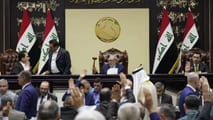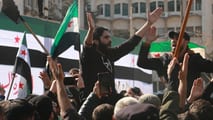ECLJ and MEP Peter van Dalen Co-Sponsor Symposium on Religious Freedom in the Middle East
(Strasbourg, France) -The European Centre for Law and Justice (ECLJ) in conjunction with Peter van Dalen, A Member of the European Parliament (MEP) hosted a joint symposium at the European Parliament in Strasbourg, France on July 3, 2013. The symposium entitled “Briefing, Discussion and Legal Implications of Religious Persecution” focused on the legal status of and reality for minority religious groups in the Middle East and North Africa, with a focus on Egypt, Turkey, Pakistan and the Islamic Republic of Iran.
Peter van Dalen, member of the Christian Union Party in Holland, Member of European Parliament in the European Conservative Reformists Group as well as co-chair of the European Parliament Working Group on Religious Freedom presided over symposium which was attended by MEP’s from across the political divide, various human rights organizations, clergy and members of the general public.

Distinguished panelists included:
- Dr. Ahmed Shaheed, UN Special Rapporteur on the Situation of Human Rights in Iran
- David Schenker,Director, Program on Arab Politics at the Washington Institute
- Salih Efe, Human Rights Attorney, Globus Law Office, Ankara, Turkey
- Robert Ash, Senior Counsel, European Centre for Law and Justice
- Sam Yeghnazar, Director and CEO of ELAM Ministries
- Marc Fromager, Director of Aid to the Church in Need, France
Dr. Ahmed Shaheed, UN Special Rapporteur on the Situation of Human Rights in Iran, delivered a detailed presentation on freedom of religion and belief in Iranian law, the current situation of religious freedom in Iran as well an overview of those groups, in Iran, facing the harshest persecution for their faith. As regards the Baha’is, Dr. Shaheed detailed the extreme difficulties they face:
“Baha’is are arguably the most persecuted religious group in the country. In addition to exclusion from constitutional recognition and legal limitations on their religious practices, members of the Baha’i community continue to face arbitrary arrest, torture and ill-treatment, restrictions to higher education, employment discrimination, destruction of property, and more. Many Iranian religious and governmental leaders view the faith as antithetical to the particular religious doctrines adopted by the leadership of the Islamic Republic.”
Regarding Christians, Dr. Shaheed noted the particular difficulties facing converts from Islam:
“Christians and those that convert to Christianity in Iran are also subjected to a wide range of human rights violations, including threats to life, ill-treatment, restrictions of assembly and association, arbitrary arrests, and violations of due process rights. It has been reported that Christians have been singled out by Iranian authorities either because they were converts from Islam, because they proselytized, or as a result of participation in informal “house-churches” with congregations consisting of mostly converts. In Iran, conversion is seemingly criminalized. While “apostasy” is not specifically criminalized under Iranian law, Iran’s new penal code allows for judges to rely on Islamic jurisprudence in the absence of written law. In doing so, Iranian judges frequently seek the opinions of clerics which often view apostasy as a capital offence.”
The ECLJ, along with its U.S. affiliate, the American Center for Law and Justice (ACLJ), are working to secure the freedom of Christian Pastor Saeed Abedini, who has been imprisoned in Iran simply because of his religious beliefs. The ACLJ has launched an international campaign of support (www.savesaeed.org) to free Pastor Saeed, a U.S. citizen.

David Schenker, Director, Program on Arab Politics at the Washington Institute, addressed the situation in Egypt, and the removal of that country’s first democratically elected president, Mohamed Morsi. In his presentation, Mr. Schenker discussed the effects of having a democratically elected president while at the same time having the government pass undemocratically a new Constitution:
“Both politically and in terms of religious freedoms, Egypt has yet to realize gains from the 2011 popular revolt. There is little doubt that the political discourse has changed and that there is an unprecedented exercise of freedom of expression today in Egypt. But at the same time, with the election of Muslim Brotherhood President Mohammed Morsi, these freedoms are in the process of being rolled back. In addition, as part of the Governmental assault on this new freedom of speech—i.e., the arrest of regime critics and the impending passage of an extremely restrictive NGO law—the Morsi regime has passed (undemocratically) a new Constitution that curtails religious freedom in Egypt. This trend has many Egyptians saying that the revolution merely succeeded in - replacing an autocrat with a theocrat -.”

Salih Efe, Globus Law Office, Ankara, Turkey, provided a historical and contextual view of religious freedom on Turkey from the final stage of the Ottoman Empire through the current day and in context of Turkey’s efforts to join the European Union. In conclusion, Mr. Efe summarized the current situation of religious freedom in Turkey as:
“With Turkey’s vigorous efforts to join the European Union and fulfill the requirements necessary to qualify for membership, debates over minority rights have become central to the nation’s agenda. In expressing a strong and persistent aspiration to become an EU member, Turkey has committed itself to meeting the political criteria for membership, including respecting and protecting its minorities. Towards that end, the Turkish Government has undertaken fundamental constitutional and legal reforms in an unprecedented demonstration of political will and efficiency, starting with constitutional amendments in 2001 and forging ahead with many subsequent “reform packages” the Parliament has passed. Although they are positive measures and are headed in the right direction, close scrutiny of the new laws and their implementation to this date reveals that they are far from guaranteeing the constitutional protection of minorities which the EU requires and to which the Turkish Government has committed itself. Instead, they constitute much belated—if nevertheless welcome—steps toward granting some fundamental rights to members of some minority groups, leaving, despite such progress, much more that needs to be done to achieve respect for, and protection of, all minorities(23).”
Robert Ash, Senior Counsel with the ECLJ, described the current situation in Pakistan regarding the persecution of Shias, Ahmadis, Hindus and Christians. He discussed the development and impact of the Blasphemy Laws as well as highlighted specific cases of religious persecution handled by ECLJ’s affiliate in Pakistan, The Centre for Law and Justice. Mr. Ash concluded his presentation with specific recommendations for the European Union in relation to financial assistance provided to Pakistan:
- Reforming Islamic school curricula so that religious schools are no longer breeding places of religious hatred, intolerance, and violence. Such reform needs to encompass the current funding of the schools by religious extremists.
- Gaining effective control of Islamic Militant groups so that legal impunity no longer exists for those perpetrating violence upon religious minorities.
- Reforming legal education so that attorneys and judges are aware of and understand the law and the importance of the rule of law. In many cases attorneys fail to simply assert their clients’ rights under the law. Our attorneys’ work in Pakistan has shown that there are judges willing to follow the law if the attorneys properly inform them of the law when asserting their clients’ rights.
- Repealing the blasphemy laws. In the alternative, amend the blasphemy laws so that they, at a minimum, protect people of all religious communities and cannot be applied in an arbitrary and discriminatory manner. This involves the inclusion of substantive or procedural safeguards against corrupt and preferential application of such laws.
- Enacting legislation that would severely punish all persons who make false accusations of criminal activity.
- Requiring the police to vigorously and impartially protect the public against all
Sam Yeghnazar, Founder and Director of ELAM Ministries, explained how the Christian Church is growing in Iran due to the disillusionment of the people with the Islamic Regime.
Mr. Yeghnazar explained that Iranians are seen as the most open Muslim people to Christianity with a deep spiritual hunger due to the political, economic and spiritual situation on Iran. There are currently an estimated 100,000 Christians from a Muslim background and there are more persons have become Christians in Iran since the revolution of 1979 than in the previous 1,300 years. (www.elam.org)

Marc Fromager, France’s Director of Aid to the Church in Need, provided an important look at the Arab Spring with a specific examination of what occurred in the Middle-East, the consequences for the local populations as well as the implications for Europe. Mr. Fromager also described the struggle between Islam and modernity concluding that:
“One can also hope that French and European Muslims, who are more and more in contact with democracy, and benefit from a different way of living than that of the “South”, take part in this result in a more active way.
…one should also hope that Christians won’t disappear from the Middle-East. Their link with the Christians here in the West and their faith, which is based on the equal dignity of all and the love of their neighbours, should be considered as assets in these changing times and therefore should be protected instead of being harassed. They also have something to say for the Arab spring to finally become a positive event.”

This symposium was a significant opportunity to join together with other leaders and government officials who are dedicated to the defense of human rights in their own countries and around the world. We are grateful to Peter van Dalen, MEP, for partnering with the ECLJ for this important event.
The European Centre for Law and Justice is an international, Non-Governmental Organization dedicated to the promotion and protection of human rights in Europe and around the world. The ECLJ holds special Consultative Status before the United Nations/ECOSOC since 2007. The ECLJ acts within the judicial, legislative, and cultural domains. The ECLJ defends, in particular, the right to religious freedom, the life and dignity of persons before the European Court of Human Rights and the other mechanisms afforded by the United Nations, the Council of Europe, the European Parliament, and the Organization for Security and Cooperation in Europe (OSCE). The ECLJ bases its actions on “the spiritual and moral values which are the common heritage of [European] peoples and the true source of individual freedom, political liberty and the rule of law, principles which form the basis of all genuine democracy” (Preamble of the Statute of the Council of Europe)









